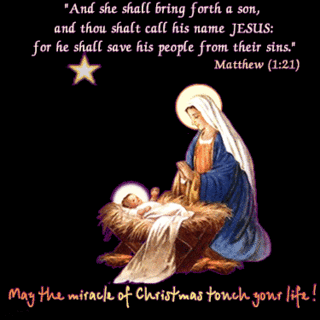
Midnight Mass 2023
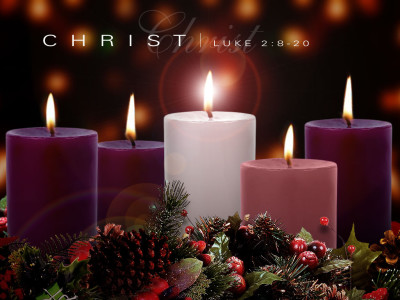
Gospel reading: Luke 2:1-14
vs.1 Now at this time Caesar Augustus issued a decree for a census of the whole world to be taken.
vs.2 This census – the first – took place while Quirinius was governor of Syria,
vs.3 and everyone went to his own town to be registered.
vs.4 So Joseph set out from the town of Nazareth in Galilee and travelled up to Judaea, to the town of David called Bethlehem, since he was of David’s House and line,
vs.5 in order to be registered together with Mary, his betrothed, who was with child.
vs.6 While they were there the time came for her to have her child,
vs.7 and she gave birth to a son, her first-born. 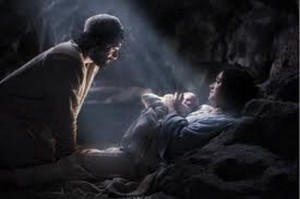
She wrapped him in swaddling clothes and laid him in a manger because there was no room for them at the inn.
vs.8 In the countryside close by there were shepherds who lived in the fields and took it in turns to watch their flocks during the night.
vs.9 The angel of the Lord appeared to them and the glory of the Lord shone round them. They were terrified,
vs.10 but the angel said, “Do not be afraid. Listen, I bring you news of great joy, a joy to be shared by the whole people.
vs.11 Today in the town of David a saviour has been born to you; he is Christ the Lord.
vs.12 And here is a sign for you: you will find a baby wrapped in swaddling clothes and lying in a manger.”
vs.13 And suddenly with the angel there was a great throng of the heavenly host, praising God and singing:
vs.14 “Glory to God in the highest heaven, and peace to men who enjoy his favour.”
*****************************************************
We have four commentators available from whom you may wish to choose . Scroll down to the name of the commentator.
Michel DeVerteuil : Fmr director of the Centre of Biblical renewal in .
Thomas O’Loughlin: Professor of Historical Theology, University of Nottingham.
Sean Goan: Studied scripture in Rome, Jerusalem and Chicago and teaches at Blackrock College and works with Le Chéile schools
Donal Neary SJ: Editor of The Sacred Heart Messenger and National Director of The Apostlship of Prayer.
General Comments
This well-known story is very rich so we will focus on some aspects only, staying with Mary’s perspective, especially in verses 6 to 7
In verses 6 and 7 Luke tells us that Mary gave birth “when the time came for her to have her child.” Contrary to the popular interpretation, he indicates no regret that there was no room in the inn. All happened as was foretold.
To understand the significance of verse 19, it is important to note that the Greek word which we translate as “things” is rhema, means both “word” and “event”. Mary, through her interior attitude of respectful listening, turns the event into a sacred word.
Prayer reflection
“Nothing happens before its time.” …Old Trinidadian saying
Lord, we pray for those who are involved in lofty projects and are becoming impatient:
– parish youth leaders who are not getting co-operation;
– a new party that has won no seats in the elections;
– parents who are trying in vain to dialogue with their teenagers.
Help them to remember Mary and how when the time came
For her to have her child she gave birth to a son.
She was at peace, felt no great concern that there was no room for them in the inn,
Merely wrapped her child in swaddling cloths and laid him in a manger.
 Lord, these days we are all very busy.
Lord, these days we are all very busy.
At work or in school we have to expend much effort to achieve success.
At home we are bombarded with information from television and radio.
We have time only for the sensational
and we allow the ordinary events of life to come and go:
– the signs of maturity in our children;
– the life crises of those close to us;
– new stirrings of resentment or of hope among ordinary people in our country.
Even in our relationship with you we concentrate on the miraculous
and the extraordinary, glorify and praise you because things turn out exactly as we were told they would.
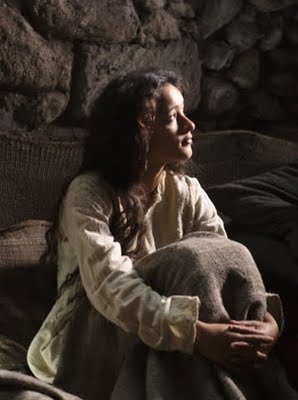 Mary teaches us on the contrary
Mary teaches us on the contrary
to see in every event a call to grow,
a sacred word you speak to us,
to be welcomed as a treasure and pondered in our hearts, reflected on and integrated into our consciousness.
Lord, help us to be more like Mary.
“My (monastic) cell will not be one of stone or wood, but of self-knowledge.” …. St Catherine of Siena
Lord, we thank you for all the contemplatives in the world,
those in enclosed convents, and those called, like Mary,
to live in their families and in secular surroundings.
While others chatter and repeat endlessly what they have been told,
these, like Mary, need to know how to be silent,
treasuring things and pondering them in their hearts.
********************************************************
Thomas O’Loughlin
Liturgical Resources for the Year of Matthew
www.columba.ie

Introduction
Welcome all at the Eucharist at Christmas time!
• Acknowledge that there are visitors there, and that many of them are non-Catholics. Such an acknowledgement can make people feel at ease that they are known about and welcomed as such. They do not feel they have to pretend not to be who they are and hide their identity.
• Make everyone feel positively welcome: wherever you come from, you are here now, and let us all thank the Father together.
• Give people the benefit of the doubt (as God gives us), so assume people are people of good will. They are not there out of bad motives or as spies from some ‘society for relativist thought’. The message to the shepherds was to all people of good will — so assume that and do not then chastise people because they do not have the right canonical credentials.
• Assuming that there are people present who have little understanding of what is going on, be that bit more explanatory. This is a basic work of the kerygma and many Catholics may benefit as well.
• Do not make excluding announcements about who can and cannot ‘receive communion’. People know the rules (it is one bit of Canon Law the media pick up on) and so presume their good will, leave it to their consciences, and to God.
• Do not make announcements that suppose that ‘being at Mass’ and ‘getting communion’ are separable realities (this possibility of separating them is itself a surviving product of a defective praxis by the church in the early middle ages): the Eucharist is a meal as that is what Jesus wanted, and part of a meal is eating!
• Do not get worried about people being there out of curiosity; but pray that what begins as curiosity may grow to faith. (It was curiosity that drew the shepherds to go over to Bethlehem according to Luke.)
• We are always called to act with charity: so we must not cause insult or pain. We must remember that God loves everyone — it is he, after all, who keeps everyone in existence.
• Show that we are people of joy, not killjoys.
• Remember: ‘a bruised reed he will not break, and a dimly burning wick he will not quench’ (Is 42:3 and Mt 12:20).
• Remember: ‘And the Pharisees and the scribes murmured, saying, “This man receives sinners and eats with them”‘ (Lk 15:2).
• Remember we do not act at the liturgy in our own name, nor as local agents / representatives of Canon Law, but in the name of the Lord ‘who desires all men to be saved and to come to the knowledge of the truth’ (1 Tim 2:4) — and no human being likes being excluded or told how defective they are. When we make people that way we push them further from the good news we are here to preach.

Homily notes
1. The homily today always seems to be inadequate: the festival is bubbling over with symbols of the season (holly, ivy, Santa, and whatnot) and with people’s heightened emotions on the big day. Moreover, the mystery that one has to speak about is so much more than anything capable of being put into words that anything actually said seems paltry and trite. Yet the day still needs a word. The day needs to have its focus drawn to the mind as well as to the senses. And, there may be many there in the assembly today who will never hear the word from one end of the year to the other, and to them alone is owed the duty of preaching. The task is to take the theme of God-with-us and present it in such a way that
(1) the homily can be followed using a framework already familiar to the audience;
(2) that seems appropriately seasonal; and
(3) that has a certain lightness suited to holiday time.
2. Here is a strategy that can produce a short homily that is easy to follow. The individuals who make up the congregation are asked to imagine where they stand in the array of people that are mentioned in the Bethlehem scene.
3. Do you imagine
y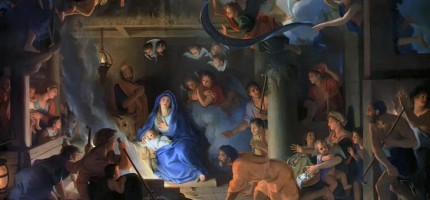 ourself as one of the people inside the inn? For this group the birth of Jesus is an irrelevance: it does not touch them and they show no interest. To them it was just an external knock on the door, and they just kept going on with what they were doing.
ourself as one of the people inside the inn? For this group the birth of Jesus is an irrelevance: it does not touch them and they show no interest. To them it was just an external knock on the door, and they just kept going on with what they were doing.
Then as now, this is the majority of people.
4. Do you place yourself among the shepherds?
Here are people who are open to wonder. They can accept good new. They are people who are already part of a faith tradition, they shared the practices, hopes, and fears of the people, but were also ready to respond with faith to the voice of God.
 5. Do you imagine yourself as one of the wise ones, the kings, who came from the east?
5. Do you imagine yourself as one of the wise ones, the kings, who came from the east?
These are people who are dedicated to searching out the great human questions, but they are not just engaged in idle speculation: they set out and searched for the truth. They listened to the promptings of conscience;
they did not come empty handed.
These are dedicated searchers after the truth and conscientious doers of the good. All their talents they are placing in the service of God-with-us.
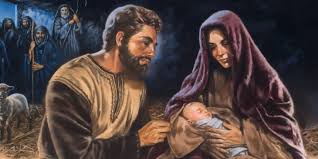 Do you imagine yourself like Joseph:
Do you imagine yourself like Joseph:
caring for the welfare of the church, working in the community, taking on special responsibilities towards the Word made flesh.
He is helping to make the good news known, and prepared to response to the inner call of vocation.
Do you imagine yourself as sharing in the vocation of Mary?
She first brought the Anointed One into the world; but it is through us that Jesus enters our world.
6. We are all at the birth scene:
each of us is called upon to fulfill all these vocations in varying ways.
***************************************************
Sean Goan
Let the Reader Understand
www.columba.ie
Gospel: Luke 2:1-14
Luke puts his account of the birth of Jesus in the context of the rule of the emperor Augustus. He is the ruler of the world and the one credited with bringing peace to the empire, yet now in the humblest of circumstances a child is born whose rule will never end and whose power derives not from military might nor economic wealth. He is the true Saviour whose birth is a cause of joy in heaven and on earth and is first announced to the disenfranchised.
Reflection
There is a remarkable variety in the twelve readings that are given for the Christmas Masses. One of the most striking things about them is that only three of them actually tell the Christmas story. The other nine are taken from both Old and New Testaments and in different ways invite reflection on the feast that is being celebrated. They all challenge us to move beyond the sentiment of the nativity play and to make our own this remarkable truth that we dare not believe. By the ‘flesh taking’ of God’s eternal Word everybody and everything is made sacred and if we accept this then we must live differently in the world for it really is a beautiful and a holy place and all the cruelty and injustice that surround us cannot be allowed to erase that.
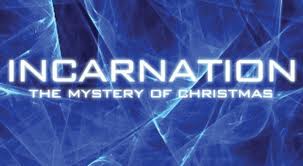
******************************************************
Donal Neary SJ
Gospel Reflections
www.messenger.ie/bookshop/
God made flesh
In a country church there was a whitewashed wall – maybe you heard this story, but like the Christmas story it’s a good one. As people came in, they bowed to the wall or blessed themselves passing it. People wondered why, as there was no picture on the wall. At a time of repainting the church, the whitewash and a few layers of paint were removed and a fresco of the nativity was found. The ritual had remained when the reason was forgotten.
There are many customs and visuals of Christmas, houses are lit up with stars, reindeer, and baubles – everything to celebrate that the divine mixed with the human in an intense way, the family of heaven and earth joined, when light and hope shone on the world. Some reminders are more direct than others. Others may be a bit like the fresco – still there and yet we wonder why. Let’s stop saying put Christ back into Christmas, say rather find Christ in all of Christmas.
In every face you see this day, think of the face of God. We often pray that the face of God may shine on us, when we are brought face to face with God we will be face to face with immense and enduring love. We long for this now and forever.
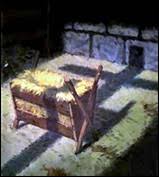 People long for justice, for peace. People long for just enough in life like street children of Calcutta and children all over the world, and we long for reconciliation. Christmas is also a reminder of them. Not alone of God’s immense love for all, but for the immense and enduring torture as God suffers still today in us all. The cross is in the crib, reminding us of the future of this child.
People long for justice, for peace. People long for just enough in life like street children of Calcutta and children all over the world, and we long for reconciliation. Christmas is also a reminder of them. Not alone of God’s immense love for all, but for the immense and enduring torture as God suffers still today in us all. The cross is in the crib, reminding us of the future of this child.
Also – enjoy all the reminders of Christmas. Let everything secular about Christmas remind us of its holy meaning.
– Every light you see,
– every red nosed reindeer,
– every cracker and
– bit of pudding,
– every bit of love under a mistletoe,
in them all see, and be aware of Christ in everything of these next few days; and be glad of the face of Christ made human for us this night.
